
The beautifully designed metal replicas are modelled on real-life weapons that come with amazing historical stories.
Touken Ranbu, or Wild Dance of Swords, is an online game where players fight against evil by calling upon legendary swords, which turn into handsome young men. It’s become such a hit in Japan that it’s spawned an anime series, a lineup of cakes, and even some adorable kitten cosplay, and now the male cast of swords has been summoned to star in a unique range of sweets produced by Premium Bandai.
The six-piece collection features individual boxes based on different characters from the game. Inside each is a traditional jellied dessert called a yōkan, which is sold in a long block and sliced up before being eaten.
To help with the slicing, each sweet comes with a 14-centimetre (5.5-inch) long replica of the sword which gave birth to the character, featuring all the same details as the real-life blade on which it’s modelled, many of which are National Treasures in Japan.
Juzumaru Tsunetsugu – salt yōkan
In the game, Juzumaru Tsunetsugu is known as one of the “five great swords of Japan”. In real life, Juzumaru is a sword originally owned by the Buddhist priest Nichiren (1222-1282), the founder of Nichiren Buddhism. Designated as an Important Cultural Property, the blade now resides at Honkō-ji temple in Hyogo Prefecture, where it goes on display every November.
Kashuu Kiyomitsu – persimmon yōkan
In real life, this handsome sword was owned by Okita Sōji (1842 or 1844–1868), one of the best swordsmen in the Shinsengumi special police force in Kyoto, and captain of the first unit. Hard to handle, it’s believed that Okita abandoned the blade after its tip broke while fighting during the infamous Ikedaya Incident in 1864.
Yamatonokami Yasusada – yuzu Japanese citrus yōkan
Another one of Okita’s swords, this one was forged in the early Edo period (1603-1868) by a master swordsmith called Yamatonokami Yasusada. Whereas Okita gave up Kashuu after it was damaged, this sword stayed with him until his dying day. Fittingly, the anime embodiment of the sword can be seen dressed in the uniform of the Shinsengumi, as an homage to its beloved owner.
Heshikiri Hasebe – brown sugar yōkan
Once the favourite sword of Oda Nobunaga (1534–1582), a powerful 16th-century Japanese feudal lord, this “Forceful Cutter”, with its red lacquered hilt, is now a National Treasure housed at the Fukuoka City Museum in Fukuoka Prefecture.
Higekiri – red bean yōkan
One of the most famous swords in early samurai history, the Higekiri, or “Beard Cutter”, was owned by samurai and court official Minamoto no Mitsunaka (912-997), before being given to his general, a samurai called Watanabe no Tsuna (953-1025). According to legend, Tsuna once severed the arm of a demon that resided at Rashomon Gate in Kyoto.
Hizamaru – matcha powdered green tea yōkan
Hizamaru, the “Knee Cutter”, was made at the request of the Emperor of Japan, and was also owned by Minamoto no Mitsunaka. This sword was given to his son Yorimitsu, but its whereabouts now remains unclear.
The high-quality sword and yōkan set includes gorgeous metal replicas made in Tsubame, a city in Niigata Prefecture renowned for its metal tableware goods. The six-piece collection can be pre-ordered from the Premium Bandai website for 5,980 yen (US$58), which includes nationwide delivery from March 2017.
Source, images: @Press

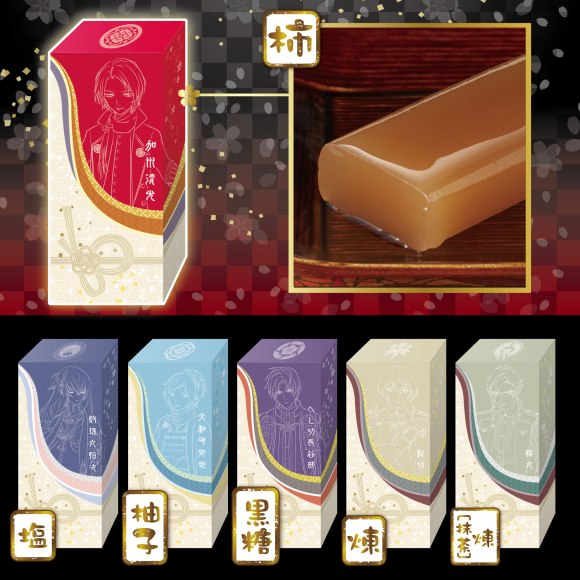
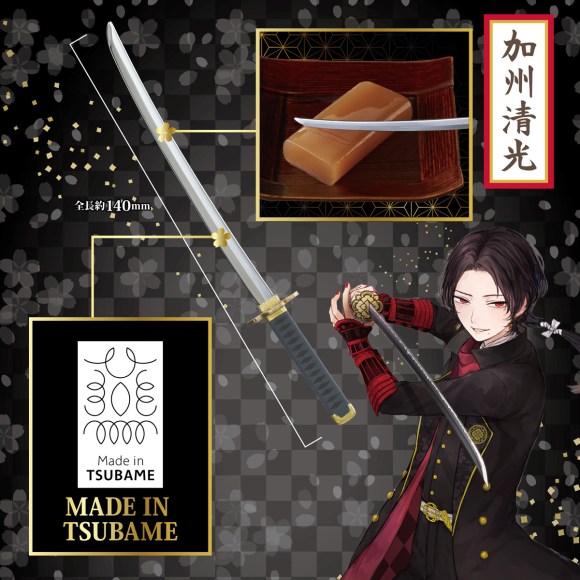
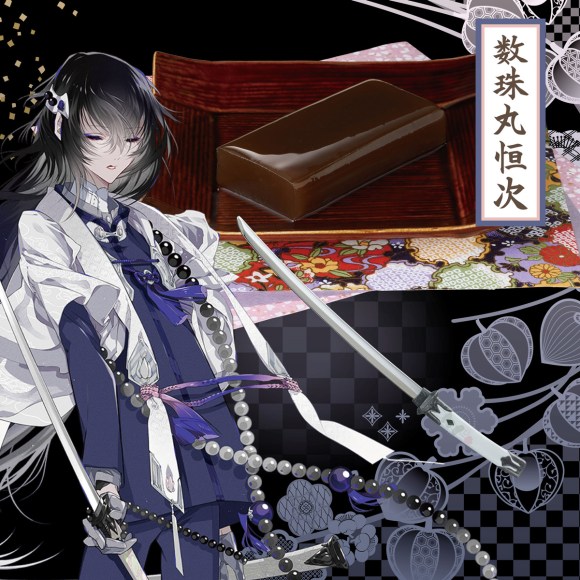
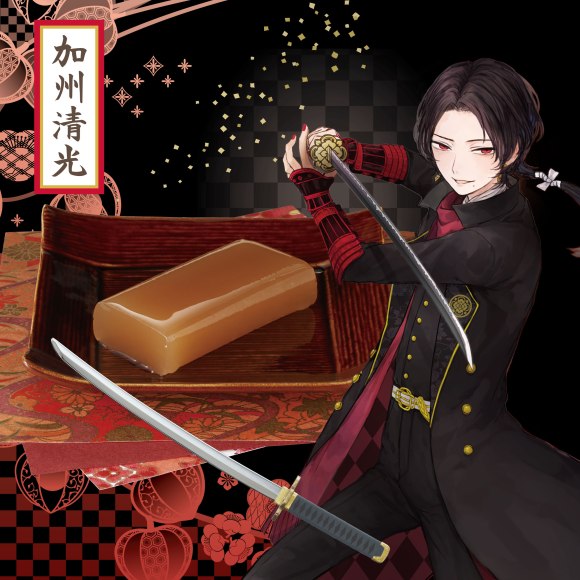
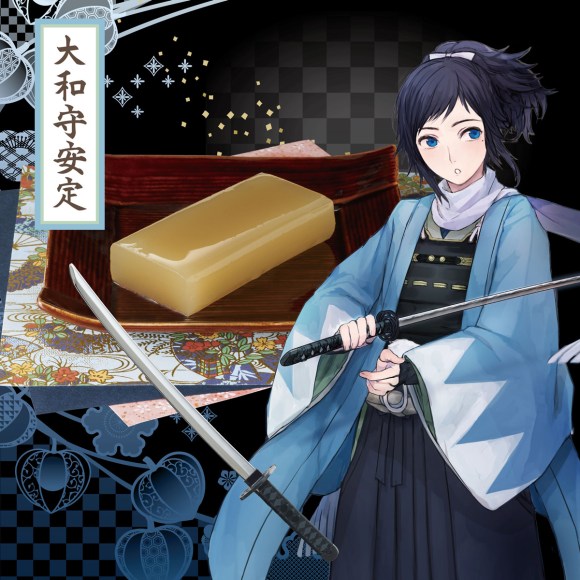
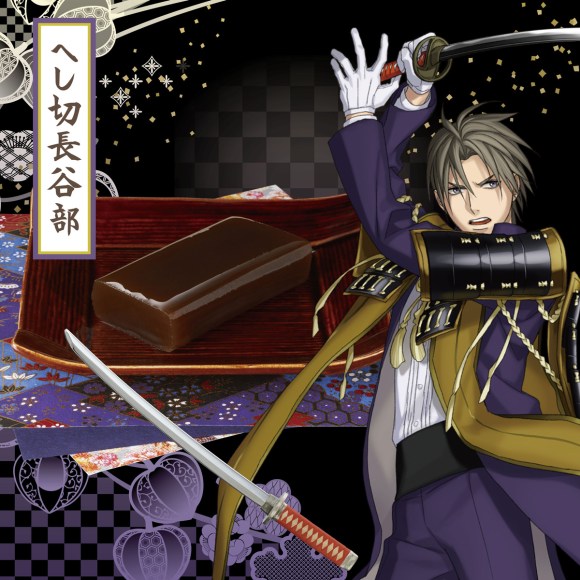
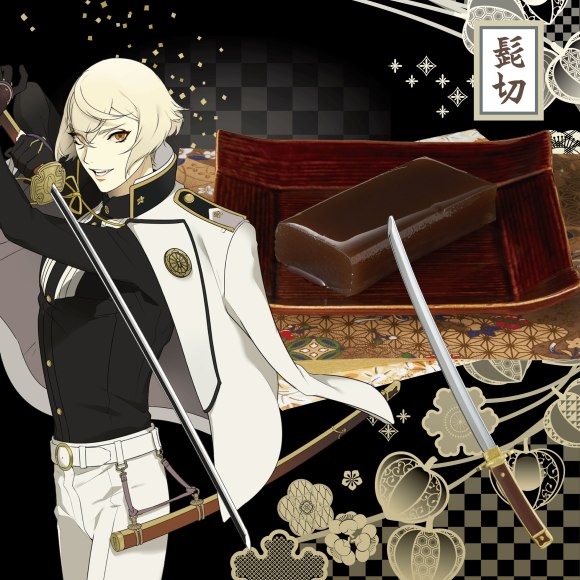
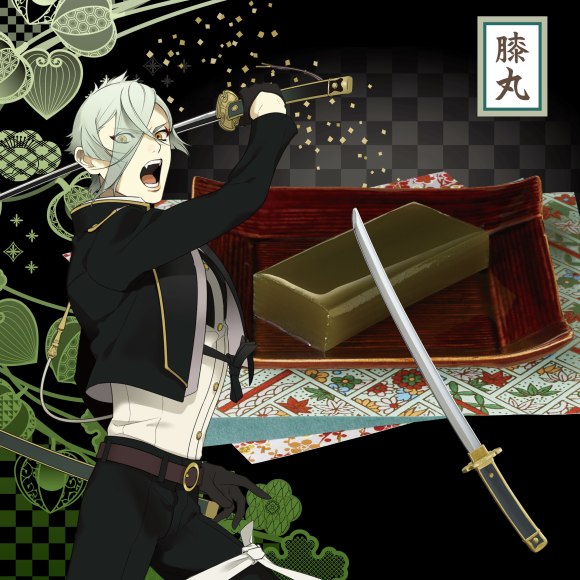
 Demon Slayer Nichiren Blades ready for new duty: Slicing through your sweets as dessert knives
Demon Slayer Nichiren Blades ready for new duty: Slicing through your sweets as dessert knives Mini samurai sword scissors are here to help you slice paper and plastic foes to pieces【Photos】
Mini samurai sword scissors are here to help you slice paper and plastic foes to pieces【Photos】 Real-life Rurouni Kenshin katana forged based on sword of series’ most merciless villain【Photos】
Real-life Rurouni Kenshin katana forged based on sword of series’ most merciless villain【Photos】 Stay dry with official Bleach umbrella swords
Stay dry with official Bleach umbrella swords Demon-slaying Dojigiri, one of Japan’s Five Swords Under Heaven, now on display at Kasuga Shrine
Demon-slaying Dojigiri, one of Japan’s Five Swords Under Heaven, now on display at Kasuga Shrine Foreigner’s request for help in Tokyo makes us sad for the state of society
Foreigner’s request for help in Tokyo makes us sad for the state of society Japanese city loses residents’ personal data, which was on paper being transported on a windy day
Japanese city loses residents’ personal data, which was on paper being transported on a windy day Should you add tartar sauce to Japanese curry rice? CoCo Ichi makes diners an unusual offer
Should you add tartar sauce to Japanese curry rice? CoCo Ichi makes diners an unusual offer Seaside scenery, history, and so many desserts on Yokohama’s Akai Kutsu【Japan Loop Buses】
Seaside scenery, history, and so many desserts on Yokohama’s Akai Kutsu【Japan Loop Buses】 Red light district sushi restaurant in Tokyo shows us just how wrong we were about it
Red light district sushi restaurant in Tokyo shows us just how wrong we were about it Mt. Koya planning to instate visitor’s tax to cope with huge tourist numbers
Mt. Koya planning to instate visitor’s tax to cope with huge tourist numbers Tokyo Tsukiji fish market site to be redeveloped with 50,000-seat stadium, hotel, shopping center
Tokyo Tsukiji fish market site to be redeveloped with 50,000-seat stadium, hotel, shopping center Beautiful Ghibli sealing wax kits let you create accessories and elegant letter decorations【Pics】
Beautiful Ghibli sealing wax kits let you create accessories and elegant letter decorations【Pics】 Harajuku Station’s beautiful old wooden building is set to return, with a new complex around it
Harajuku Station’s beautiful old wooden building is set to return, with a new complex around it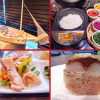 Kyoto breakfast buffet with all-you-can-eat sushi: One of the best possible ways to start a day
Kyoto breakfast buffet with all-you-can-eat sushi: One of the best possible ways to start a day McDonald’s new Happy Meals offer up cute and practical Sanrio lifestyle goods
McDonald’s new Happy Meals offer up cute and practical Sanrio lifestyle goods Japanese ramen restaurants under pressure from new yen banknotes
Japanese ramen restaurants under pressure from new yen banknotes French Fries Bread in Tokyo’s Shibuya becomes a hit on social media
French Fries Bread in Tokyo’s Shibuya becomes a hit on social media Studio Ghibli releases new action figures featuring Nausicaä of the Valley of the Wind characters
Studio Ghibli releases new action figures featuring Nausicaä of the Valley of the Wind characters New private rooms on Tokaido Shinkansen change the way we travel from Tokyo to Kyoto
New private rooms on Tokaido Shinkansen change the way we travel from Tokyo to Kyoto All-you-can-drink Starbucks and amazing views part of Tokyo’s new 170 meter-high sky lounge
All-you-can-drink Starbucks and amazing views part of Tokyo’s new 170 meter-high sky lounge Studio Ghibli releases Kiki’s Delivery Service chocolate cake pouches in Japan
Studio Ghibli releases Kiki’s Delivery Service chocolate cake pouches in Japan New definition of “Japanese whiskey” goes into effect to prevent fakes from fooling overseas buyers
New definition of “Japanese whiskey” goes into effect to prevent fakes from fooling overseas buyers Our Japanese reporter visits Costco in the U.S., finds super American and very Japanese things
Our Japanese reporter visits Costco in the U.S., finds super American and very Japanese things Studio Ghibli unveils Mother’s Day gift set that captures the love in My Neighbour Totoro
Studio Ghibli unveils Mother’s Day gift set that captures the love in My Neighbour Totoro More foreign tourists than ever before in history visited Japan last month
More foreign tourists than ever before in history visited Japan last month New Pokémon cakes let you eat your way through Pikachu and all the Eevee evolutions
New Pokémon cakes let you eat your way through Pikachu and all the Eevee evolutions Sales of Japan’s most convenient train ticket/shopping payment cards suspended indefinitely
Sales of Japan’s most convenient train ticket/shopping payment cards suspended indefinitely Sold-out Studio Ghibli desktop humidifiers are back so Totoro can help you through the dry season
Sold-out Studio Ghibli desktop humidifiers are back so Totoro can help you through the dry season Japanese government to make first change to romanization spelling rules since the 1950s
Japanese government to make first change to romanization spelling rules since the 1950s Ghibli founders Toshio Suzuki and Hayao Miyazaki contribute to Japanese whisky Totoro label design
Ghibli founders Toshio Suzuki and Hayao Miyazaki contribute to Japanese whisky Totoro label design Doraemon found buried at sea as scene from 1993 anime becomes real life【Photos】
Doraemon found buried at sea as scene from 1993 anime becomes real life【Photos】 Tokyo’s most famous Starbucks is closed
Tokyo’s most famous Starbucks is closed One Piece characters’ nationalities revealed, but fans have mixed opinions
One Piece characters’ nationalities revealed, but fans have mixed opinions We asked a Uniqlo employee what four things we should buy and their suggestions didn’t disappoint
We asked a Uniqlo employee what four things we should buy and their suggestions didn’t disappoint Princesses, fruits, and blacksmiths: Study reveals the 30 most unusual family names in Japan
Princesses, fruits, and blacksmiths: Study reveals the 30 most unusual family names in Japan Dojigiri, the millennium-old katana said to have slain a demon, is now on display in Tokyo【Pics】
Dojigiri, the millennium-old katana said to have slain a demon, is now on display in Tokyo【Pics】 Is that a giant sword in your pocket or are you just happy to see me?【Video】
Is that a giant sword in your pocket or are you just happy to see me?【Video】 Amazing exhibition of Japan’s legendary “cursed katana” is going on right now【Photos】
Amazing exhibition of Japan’s legendary “cursed katana” is going on right now【Photos】 Samurai sword hunt begins as storm washes away blacksmith’s warehouse in Gifu Prefecture
Samurai sword hunt begins as storm washes away blacksmith’s warehouse in Gifu Prefecture Swords of famous samurai reborn as beautiful kitchen knives from Japan’s number-one katana town
Swords of famous samurai reborn as beautiful kitchen knives from Japan’s number-one katana town Genuine Muramasa blade and Muromachi katana on display at Tokyo’s Touken Ranbu store【Photos】
Genuine Muramasa blade and Muromachi katana on display at Tokyo’s Touken Ranbu store【Photos】 Japanese samurai sword ice cream crafted by master swordsmith from famous katana town of Seki
Japanese samurai sword ice cream crafted by master swordsmith from famous katana town of Seki Japan is running out of swordsmiths, and a strict apprenticeship requirement is a big reason why
Japan is running out of swordsmiths, and a strict apprenticeship requirement is a big reason why Japan’s legendary Brother Katana might not be brothers after all? Investigating the mystery【Pics】
Japan’s legendary Brother Katana might not be brothers after all? Investigating the mystery【Pics】 Wield a life-size replica of Tanjiro’s demon-slaying Nichirin Blade for your next cosplay
Wield a life-size replica of Tanjiro’s demon-slaying Nichirin Blade for your next cosplay One Piece anime katanas recreated as exquisite letter openers by Japan’s swordsmith legacy heirs
One Piece anime katanas recreated as exquisite letter openers by Japan’s swordsmith legacy heirs Cosplay-friendly interior design — Japanese cosplayer shows off crazy apartment entryway
Cosplay-friendly interior design — Japanese cosplayer shows off crazy apartment entryway Legendary crescent moon katana, one of Japan’s Five Swords Under Heaven, now on display in Tokyo
Legendary crescent moon katana, one of Japan’s Five Swords Under Heaven, now on display in Tokyo Ingenious cosplayer shows us how to make sword blades nearly two meters long for a few bucks
Ingenious cosplayer shows us how to make sword blades nearly two meters long for a few bucks Final Fantasy VII silicone mold lets you make Buster Sword chocolates, ice cubes in your freezer
Final Fantasy VII silicone mold lets you make Buster Sword chocolates, ice cubes in your freezer
Leave a Reply